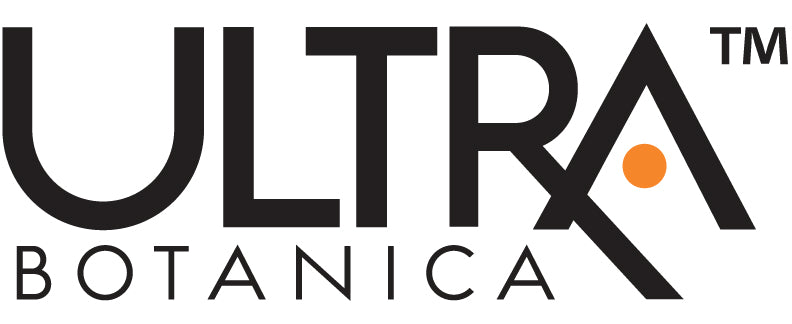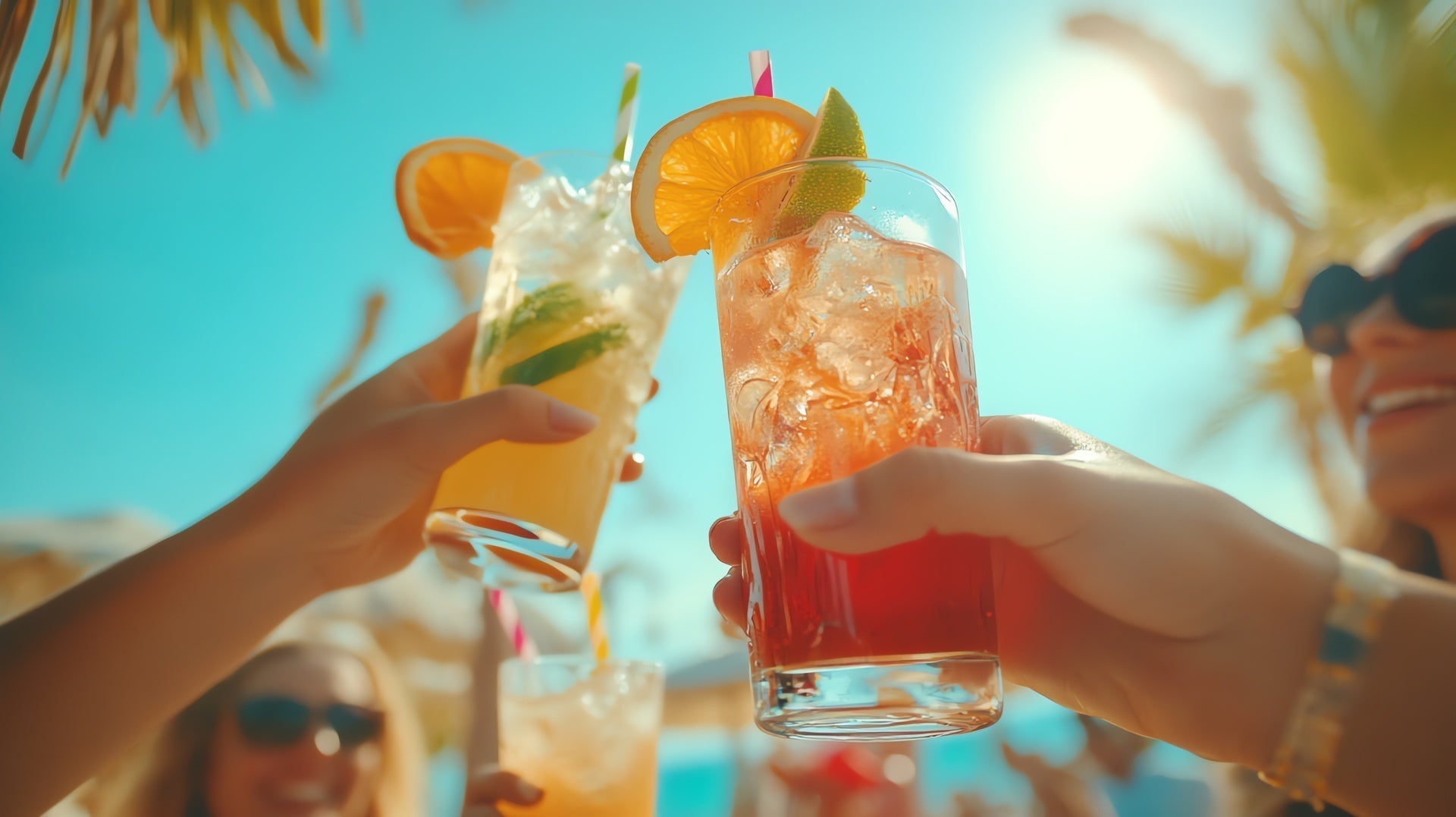Have you ever been curious about mocktails? Or thought about doing a "dry July"? More people are embracing these alcohol-free drinks, and for good reason.
Mocktails benefits go beyond great taste... choosing non-alcoholic options can support your overall health, reduce disease risk, and help you feel more energized and clear-headed.
From creative flavor combinations to a greater sense of mindfulness, mocktails benefits offer a refreshing path to wellness—without giving up the joy of a well-crafted drink.
The Not-So-Sweet Side of Alcohol
Before we explore delightful mocktail recipes, it helps to understand why you might look for alcohol alternatives.
Chronic excessive alcohol consumption is associated with direct and indirect adverse effects, including cardiovascular disease, nutritional deficiencies, cancer, accelerated aging, and more.
One of the characteristics that makes alcohol so harmful is its systemic toxic effect on the human body. It has been described as having some kind of effect on all human body organs either in acute or chronic consumption.
The liver is the most at-risk organ, since alcohol is mostly metabolized there. But gastrointestinal, central and peripheral nervous systems, the heart and vascular system, endocrine system, and muscular-skeletal systems are also affected
Traditionally, low-to-moderate drinking was believed to offer some cardiovascular protection, but newer research contradicts this. An analysis in The Lancet concluded that no level of alcohol consumption improves health—and even small amounts of alcohol increase the risk of disease.

Your Heart and Alcohol
Drinking alcohol can harm your heart in several ways. Heavy or regular consumption is linked to high blood pressure, increased risk of heart disease, and atrial fibrillation (A-Fib).
Alcohol may trigger A-Fib by altering electrical conduction, depleting magnesium and potassium, and worsening related risk factors such as high blood pressure, sleep apnea, and obesity.
Alcohol also disrupts sleep, especially when consumed in the evening, by relaxing the tongue and airway muscles. It also exacerbates sleep apnea, another A-Fib risk.
According to the American Heart Association, excessive alcohol use increases the risk of stroke, heart failure, and alcoholic cardiomyopathy, a weakening of the heart muscle.
Choosing alcohol-free drinks or cutting back can help protect your heart, particularly if you have a family history of heart problems.
Alcohol's Impact on Your Brain
Alcohol affects brain health, so mocktails benefits extend to protecting your brain. Heavy drinking is linked to brain atrophy, neuron loss, and reduced white matter integrity.
While light-to-moderate drinking was once debated, a 2022 study published in Nature Communications analyzed data from 36,678 healthy adults and found that even one to two alcoholic drinks per day was associated with reduced brain volume.
This reduction was comparable to two years of brain aging. The more alcohol consumed, the greater the impact. Alcohol also impairs memory, focus, decision-making, and neuroplasticity—even in moderate amounts. Over time, it disrupts brain structure and function.
Choosing nonalcoholic options like mocktails benefits the brain and is a smart, protective choice. The mocktails benefits go beyond physical health—they support cognitive clarity, emotional balance, and long-term brain health.
Liver Health Concerns with Alcohol
Alcohol is tough on the liver and remains a leading cause of liver diseases like fatty liver, hepatitis, and cirrhosis. Chronic drinking triggers inflammation and scarring, impairing liver function over time.
A large 2020 meta-analysis of over 2.6 million people found alcohol to be a major risk factor for cirrhosis, with risk increasing sharply with higher intake.
Women may be more vulnerable, even at lower consumption levels. The study concluded that heavy drinkers should receive interventions to cut back.
Cirrhosis, a life-threatening condition caused by long-term alcohol use, is preventable. Choosing mocktails gives your liver a break and helps reduce long-term risk.

Cancer, Metabolic Risks, and More
Alcohol is now classified as a Group 1 carcinogen, meaning there’s strong evidence it causes cancer in humans—specifically breast, liver, colon, and esophageal cancers, among others.
It also raises cardiometabolic risks by elevating blood pressure, triglycerides, and insulin resistance. Alcohol promotes fat buildup in the liver and disrupts glucose regulation. If your blood pressure, lipid counts, and blood sugar levels run high, you might want to consider reducing alcoholic intake.
Additionally, alcohol increases gut permeability, driving systemic inflammation and impairing insulin sensitivity. Beyond the physical damage, alcohol disrupts sleep, worsens mental health, weakens immunity, and accelerates aging.
The overall toll includes a higher risk of chronic disease, injury, and addiction. Public health experts agree—less alcohol is better, and for many, quitting altogether offers powerful health and wellness protection.
Embracing the Positive: Unpacking More Mocktails Benefits
Now for the really good part... choosing mocktails is not just about avoiding negatives. It is also about embracing many positives, as these nonalcoholic drinks bring some joy and well-being to the table, without the negatives.
Better Physical Health
One of the first mocktails benefits people notice is waking up refreshed—no more hangovers, headaches, or that sluggish post-drinking fog.
Better sleep is a major plus, as alcohol disrupts deep, restorative rest. Improved sleep means more energy, focus, and overall well-being.
Mocktails are also hydrating. Many include sparkling water, fresh citrus juice, or coconut water, which support energy levels, kidney function, and immune health.
Some ingredients, like berries or pomegranate juice, add antioxidants that help fight oxidative stress and promote cellular health.
Mocktails tend to be lower in calories compared to alcoholic drinks, especially sugary cocktails. Choosing mocktails with real fruit instead of syrup can help with blood sugar balance and weight management.
Another often-overlooked benefit: some mocktail ingredients, like lemon balm or valerian root, promote natural relaxation—making the mocktails benefits even more rewarding for mind and body.
Enhanced Mental Clarity and Mood
Alcohol can leave you with brain fog, but mocktails benefits include sharper thinking and better focus—great for work and daily tasks. Staying clear-headed supports cognitive function and mental clarity.
Since alcohol is a depressant, choosing mocktails instead can also mean fewer mood swings and steadier emotional health. You may feel more upbeat and relaxed without artificial interference.
Improved sleep and hydration from choosing mocktails lead to better energy and increased productivity. You feel more balanced, less stressed, and more in control—just a few of the many mocktails benefits worth considering.

Inclusive Socializing
Mocktails create a more inclusive and welcoming atmosphere at social gatherings. They offer a thoughtful way to ensure everyone feels part of the celebration—regardless of their drink choice.
This option is especially appreciated by:
-
Designated drivers
-
Expectant mothers
-
Individuals with health conditions
-
People on medications that interact with alcohol
-
Those practicing sobriety or mindful drinking
By normalizing non-alcoholic options, mocktails benefits include less pressure to drink alcohol and promote a more supportive environment. It’s a small gesture that shows care and consideration from the host, making everyone feel seen, respected, and included.
Exploring New Flavors Creatively
Making mocktails is a fun and creative hobby that lets you explore a wide range of ingredients—fresh fruits, herbs like mint or rosemary, and aromatic spices.
Unique combinations like basil with strawberries or rosemary with grapefruit juice can awaken your taste buds and support a healthier lifestyle.
As a home mixologist, you control the ingredients and sweetness, making your drinks both flavorful and nourishing. It’s a satisfying outlet that also impresses guests with handcrafted nonalcoholic creations.
With the rise of mindful drinking, the beverage industry now offers a growing selection of nonalcoholic spirits and mixers, making it easier than ever to craft sophisticated drinks.
Sharing your mocktail recipes online can add a social element to the experience and inspire others.
The Rise of the Sober Curious Movement
The rising popularity of mocktails benefits is closely tied to the “sober curious” movement, which encourages people to reflect on their relationship with alcohol.
It’s not so much about total abstinence, but about mindful drinking and exploring a lifestyle with less or no alcohol—where mocktails benefits fit in perfectly.
This trend is fueled by growing awareness of the health perks of cutting back on alcohol, a broader wellness movement, and the influence of social media sharing creative mocktail recipes.
Mocktails serve as a satisfying, social-friendly alternative for those who want to enjoy the moment without alcohol. Fun and relaxation don't have to involve drinking. Embracing mocktails is a self-care choice that reflects a commitment to real health.

Beyond the Buzz: Smart Mocktail Choices
While mocktails benefits are many, not all are created equally in terms of health benefits. Some store-bought or cafe versions can hide less than healthy ingredients, such as high fructose corn syrup, or high amounts of cane sugar.
Be a savvy consumer when choosing mocktails so you get all the mocktails benefits without hidden pitfalls.
The Hidden Pitfalls in Some So-Called "Healthy" Drinks
Some commercial mocktail mixers and nonalcoholic drinks are packed with sugar from fruit juice concentrates, syrups (like high-fructose corn syrup), or sweetened sodas like tonic water.
Excess sugar—especially high-fructose corn syrup—can also harm your liver (like alcohol), contribute to fatty liver disease, weight gain, and raise the risk of chronic conditions like diabetes.
Reading labels is essential. Even products with artificial sweeteners may come with their own health concerns. Choosing healthier mocktails means looking for lower-sugar options made with real ingredients, such as real fruit and unsweetened sparkling water.
Classic non-alcoholic drinks, like a Shirley Temple, can be sugar bombs, combining grenadine and soda, loaded up with added sugars. Careful selection ensures your mocktail supports wellness, not just flavor.
Your Guide to Low-Sugar, No-Stevia Options
Good news! You can enjoy mocktails benefits without added sugar or sweeteners by using naturally flavorful ingredients. Sparkling water is a top choice—it’s calorie-free and available in varieties with natural fruit essences, making it an ideal base.
Fresh fruit purees or muddled fruits like berries, citrus, or cucumber add subtle sweetness and aroma. Herbs such as mint, basil, rosemary, or lavender add complexity without sugar. Spices like fresh ginger, cinnamon, or cardamom add depth and warmth.
Tart flavors like unsweetened cranberry or lime juice help balance sweetness. Unsweetened iced teas—green, black, or herbal (like lemon balm for relaxation)—also make excellent bases.
For convenience, some companies offer low-sugar, stevia-free botanical mixers. Always check labels to keep your mocktails benefits clean and health-forward.
Summer Sips: Refreshing, Guilt-Free Mocktail Recipes
As the weather warms up, nothing beats a cool, refreshing drink. These mocktail recipes focus on fresh flavors. They're low in sugar and contain no artificial sweeteners or stevia.
They're crafted to support your health, quench your thirst, and delight your senses. Enjoy these simple creations and adjust them to suit your personal taste. That's the beauty of homemade mocktails... you're the artist.

Cucumber Mint Cooler
This nonalcoholic drink is incredibly refreshing. The coolness of cucumber with bright mint is a classic pairing, perfect for a hot afternoon and good health.
- Half a cucumber, thinly sliced
- Small handful of fresh mint leaves
- Juice of 1 lime (fresh lime juice is best)
- Sparkling water
- Ice cubes
- In a sturdy glass, gently muddle a few cucumber slices with mint leaves. Do not over-muddle the mint, or it can turn bitter.
- Add lime juice and fill the glass with ice.
- Top with sparkling water.
- Garnish with remaining cucumber slices and a sprig of mint. Stir gently.
Ginger Lime Spritzer
This spritzer has a lovely zing. Fresh ginger gives it warmth. Fresh lime adds a tart counterpoint. It's very invigorating and a great alcohol-free option.
- 1-inch piece of fresh ginger, peeled and thinly sliced or grated
- Juice of 1 lime (use fresh lime for best flavor)
- Sparkling water
- Optional: A thin lime wheel for garnish
- Ice cubes
- If using sliced ginger, muddle it gently in a glass to release its flavor. If grated, add it directly.
- Add lime juice to the glass.
- Fill the glass with ice.
- Top with sparkling water. Stir well.
- Garnish with a lime wheel if you like.

Watermelon Basil Breeze
Watermelon is naturally sweet and hydrating, a great source of real fruit goodness. Basil adds an unexpected, delightful peppery note.
This nonalcoholic drink screams summer freshness and is a great way to combat oxidative stress with watermelon's antioxidants. It's a truly refreshing combination.
- 1 cup diced seedless watermelon
- 3-4 fresh basil leaves
- Splash of lime juice (optional, for extra tartness)
- Sparkling water or plain water
- Ice cubes
- Muddle the diced watermelon and basil leaves together in a glass just enough to release the juice.
- If using, add a splash of lime juice.
- Fill the glass with ice.
- Top with sparkling water, or plain water for a less fizzy version.
- Stir and garnish with a small watermelon wedge or a basil leaf.
Rosemary Grapefruit Fizz
This mocktail recipe offers a more complex, herbal flavor. The slight bitterness of grapefruit juice pairs well with aromatic rosemary. It feels quite sophisticated and supports mindful drinking.
- 1 sprig of fresh rosemary
- 2-3 ounces fresh grapefruit juice (unsweetened)
- Sparkling water
- Optional: Grapefruit slice for garnish
- Ice cubes
- Gently bruise the rosemary sprig by rolling it between your palms this releases its oils. Place it in a glass.
- Add fresh grapefruit juice.
- Fill the glass with ice cubes.
- Top with sparkling water.
- Stir gently and garnish with a slice of grapefruit if desired.
These mocktail recipes are just starting points. Experiment with other nonalcoholic beverages and try different herbs or fruit combinations. Use fresh, whole ingredients for the best flavor and the most significant mocktail health benefits.
Conclusion
Exploring mocktails benefits can be a truly rewarding journey. When you make your own, you naturally reduce calorie intake, improve hydration, and support better sleep.
You also lower your risk for addiction and chronic diseases like heart disease, diabetes, liver disease, and high blood pressure.
Using fresh fruits and herbs can boost the nutritional value of your drink while giving you the freedom to be creative and tailor flavors to your taste buds.
Mocktails also create a more inclusive social environment where everyone feels welcome. They encourage mindful choices, helping you avoid excess sugars, additives, and unnecessary calories.
The everyday advantages are clear—so raise a glass of something delicious and alcohol-free. Mocktails benefits are real, and they support a vibrant, healthy lifestyle.

Frequently Asked Questions
1. Are mocktails healthier than alcohol?
Yes, they typically contain fewer calories and less sugar, especially when made with fresh, whole ingredients. Mocktails also avoid the harmful effects of alcohol, such as liver damage, increased cancer risk, heart disease risk, and impaired sleep and cognition.
2. What are the health benefits of mocktails?
Mocktails offer several health benefits, including better hydration, improved sleep, reduced calorie intake, and no harmful effects from alcohol. When made with fresh ingredients, they can also provide antioxidants, vitamins, and support for heart, liver, and brain health.
3. Are nonalcoholic drinks bad for your liver?
Nonalcoholic drinks are not bad for your liver when made with healthy ingredients and consumed in moderation. However, some store-bought versions may contain high sugar or additives, which can negatively affect liver health in many of the same ways as alcohol can (fatty liver, cirrhosis).
4. What destroys the liver the most?
Prolonged or excessive alcohol use can damage the liver and impair its ability to regenerate. Giving your liver a break—even for a month or a year—can be one of the most impactful mocktails benefits.
It allows your body to recover and lowers the risk of liver disease. While the liver is resilient, alcohol makes it harder to heal, and hard to stay ahead of the damage. Excess sugar is also harmful, so if soda is your “alcohol,” it may be worth cutting back.





Share:
Adult Bedtime Routines
Summer Detox Tips (Is Summer a Good Time to Detox?)